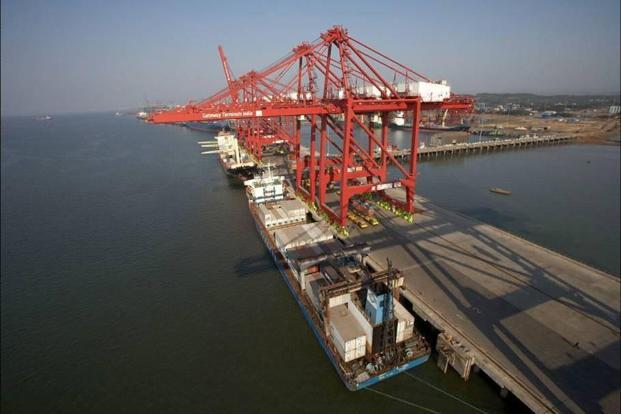Chinese-built cranes are set to play a pivotal role in the loading and unloading of cargo at the Vizhinjam multi-purpose and container transshipment port in Kerala, which is overseen by Adani Ports and Special Economic Zone (APSEZ). This development introduces an intriguing twist to the Indian government's 2020 decision to restrict the use of equipment manufactured in China for publicly funded infrastructure projects in India.
Adani Ports and Special Economic Zone has placed an order for 8 rail-mounted quay cranes and 24 cantilever rail-mounted gantry cranes with Shanghai Zhenhua Heavy Industries Co (ZPMC), recognised as the world's largest port crane manufacturer. The exact cost of this procurement remains undisclosed, as reported by individuals familiar with the matter. These cranes are scheduled to arrive in successive shipments at Vizhinjam, where they will undergo installation and testing before being commissioned for service once the port commences its operations.
Rail-mounted quay cranes, also referred to as ship-to-shore cranes, are essential for the efficient loading and unloading of cargo containers from ships.
The construction of the Vizhinjam multi-purpose and container transshipment port, the first greenfield port initiated in India in over a decade, is being supported through viability gap funding (VGF) amounting to Rs 16.35 billion. The grant, which was requested by the winning bidder, Adani Ports and Special Economic Zone, will be equally contributed by the Indian government (Rs 8178 million) and the Kerala government (Rs 8171.8 million).
Notably, on July 23, 2020, approximately two years after tensions flared between India and China along their border, the Indian government imposed restrictions on vendors and service providers from countries sharing a land border with India (without explicitly naming China) in tenders for public procurement. This decision was part of a non-tariff economic blockade against China, with the aim of bolstering defence and national security. These restrictions applied to autonomous bodies, Central public sector enterprises, and public-private-partnership (PPP) projects that received financial support from the government or its affiliated organisations. However, this policy was only applicable to new tenders for public procurement and did not affect private sector procurement.
Crucially, the Vizhinjam port project remains unaffected by the government's order regarding equipment sourcing from China during public procurement tenders. This is due to Adani Ports and Special Economic Zone having placed the crane order with ZPMC in 2018, two years prior to the implementation of these restrictions. This foresight allowed the project to avoid complications in its delivery timeline, which had already been delayed due to various factors. The Vizhinjam port project aims to reduce India's reliance on the nearby Colombo port for sending and receiving cargo containers.
Chinese cranes are in high demand among port and terminal operators worldwide due to their competitive pricing and short lead times for delivery following order placement.
It is worth noting that Chinese port cranes have previously undergone stringent scrutiny from Indian security agencies when terminal operators procured equipment for their facilities. Instances of port contracts becoming entangled in legal disputes have occurred after the government denied security clearance for the installation of Chinese cranes, especially in the vicinity of naval command centres.
Furthermore, Indian government policy prohibits Chinese firms or entities with Chinese ties from investing in and operating ports and terminals within the country, owing to the strained political relations between India and China.
In a strategic move to counter China's growing influence in the region, India secured a port contract at the crucial Colombo port through a government-to-government framework approximately two years ago. Under the leadership of Prime Minister Narendra Modi, the National Democratic Alliance government nominated Adani Ports and Special Economic Zone to construct the West Container Terminal in the Colombo port, slated to begin operations in December 2024.
In September 2020, a few months following the government's imposition of restrictions on Chinese vendors and service providers, India Ports Global, the entity responsible for developing and operating the India-funded Chabahar port in Iran, terminated a contract with ZPMC for the purchase of four rail-mounted quay cranes intended for installation at the Persian Gulf-based port in Iran. This cancellation stemmed from delays by the crane manufacturer in fulfilling the order, citing hesitancy from foreign banks to open a letter of credit, which guarantees payment to the supplier, despite a sanctions waiver granted by the US for the Chabahar port project.
These delays in erecting the quay cranes at the Chabahar port have impacted the official commencement of the ten-year contract. Nonetheless, India and Iran have initiated operations, albeit on a short-term, annual contract basis, even within the zero period.




















